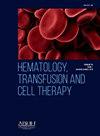霍奇金病最新进展
IF 1.6
Q3 HEMATOLOGY
引用次数: 0
摘要
霍奇金淋巴瘤(HL)是一种b细胞恶性肿瘤,约占所有淋巴瘤病例的10%和淋巴瘤相关死亡率的5%。发病率在年轻人和55岁以上人群中增加,呈双峰分布。大约95%的HL病例被诊断为经典霍奇金淋巴瘤(cHL), 5%被诊断为结节淋巴细胞显性b细胞淋巴瘤(NLPBL)。结节硬化、混合细胞、淋巴细胞耗损和淋巴细胞丰富的HL是典型HL的亚群。准确评估HL患者的疾病分期对于选择合适的治疗方法至关重要。预后模型用于确定复发风险低或高的患者,以及正电子发射断层扫描(PET)扫描确定的治疗反应,用于优化治疗。针对HL患者的初始治疗是基于疾病的组织学、解剖分期和预后不良特征。早期疾病患者通常采用联合治疗策略,利用缩短疗程的联合化疗,然后进行全野放射治疗,而晚期疾病患者则接受较长疗程的化疗,通常不进行放射治疗。然而,包括brentuximab vedotin和抗PD - 1抗体在内的新药物现在被标准地纳入一线治疗。高剂量化疗(HDCT)后自体干细胞移植(ASCT)是大多数初始治疗后复发患者的标准治疗方案。对于HDCT合并ASCT失败的患者,应考虑brentuximab vedotin, PD - 1阻断,非清髓性同种异体移植或参与临床试验。AETHERA研究(NCT01100502)显示Brentuximab Vedotin (BV)可改善难治性或复发性HL (R/R HL)患者ASCT后的无进展生存期(PFS)。对于ASCT、BV和抗pd -1后复发的患者,单克隆抗体被认为是无法治愈的,其结果相当令人沮丧,中位总生存期(OS)为2年。对于ASCT和BV均失败的难治性或复发性cHL (R/R cHL)患者,嵌合抗原受体t细胞(CAR-T)治疗提供了新的治疗选择。本文章由计算机程序翻译,如有差异,请以英文原文为准。
UPDATES ON HODGKIN DISEASE
Hodgkin Lymphoma (HL) is a B-cell malignancy accounting for approximately 10% of all lymphoma cases and 5% of lymphoma-related mortalities. Incidence increases in younger adults and those above 55-years of age and has a bimodal distribution. Approximately 95% of all HL cases are diagnosed as classical Hodgkin Lymphoma (cHL) and 5% as Nodular Lymphocyte Predominant B-cell Lymphoma (NLPBL). Nodular sclerosis, mixed cellularity, lymphocyte depletion, and lymphocyte‐rich HL are subgroups of classical HL. Risk Stratification An accurate assessment of the stage of disease in patients with HL is critical for the selection of the appropriate therapy. Prognostic models that identify patients at low or high risk for recurrence, as well as the response to therapy as determined by Positron Emission Tomography (PET) scan, are used to optimize therapy. Risk‐Adapted Therapy Initial therapy for HL patients is based on the histology of the disease, the anatomical stage and the presence of poor prognostic features. Patients with early‐stage disease are typically treated with combined modality strategies utilizing abbreviated courses of combination chemotherapy followed by involved‐field radiation therapy, whereas those with advanced stage disease receive a longer course of chemotherapy often without radiation therapy. However, newer agents including brentuximab vedotin and anti‐PD‐1 antibodies are now standardly incorporated into frontline therapy. Management of Relapsed/Refractory Disease High‐Dose Chemotherapy (HDCT) followed by an Autologous Stem Cell Transplant (ASCT) is the standard of care for most patients who relapse following initial therapy. For patients who fail HDCT with ASCT, brentuximab vedotin, PD‐1 blockade, non‐myeloablative allogeneic transplant or participation in a clinical trial should be considered. The AETHERA study (NCT01100502) shows that Brentuximab Vedotin (BV) improves Progression-Free Survival (PFS) after ASCT in patients with Refractory or Relapsed HL (R/R HL). For patients who relapse after ASCT, BV, and anti-PD-1, monoclonal antibodies were considered incurable, and their outcome is rather dismal, with a median Overall Survival (OS) of 2-years. For Refractory or Relapsed cHL (R/R cHL) patients who have failed both ASCT and BV, Chimeric Antigen Receptor T-cell (CAR-T) therapy offers a new therapeutic option.
求助全文
通过发布文献求助,成功后即可免费获取论文全文。
去求助
来源期刊

Hematology, Transfusion and Cell Therapy
Multiple-
CiteScore
2.40
自引率
4.80%
发文量
1419
审稿时长
30 weeks
 求助内容:
求助内容: 应助结果提醒方式:
应助结果提醒方式:


